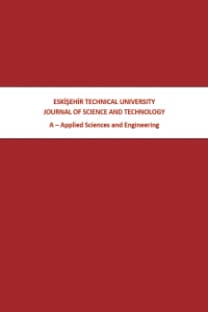A NEW MODEL ON AUTOMATIC TEXT SUMMARIZATION FOR TURKISH
Text summarization Feature selection, Classification,
___
- Güran A, Arslan SN, Kılıç E, Diri B. Sentence selection methods for text summarization. In: 2014 22nd Signal Processing and Communications Applications Conference (SIU), IEEE, 192-195.
- alZahir S, Fatima Q, Cenek M. New graph-based text summarization method. In: 2015 IEEE Pacific Rim Conference on Communications, Computers and Signal Processing (PACRIM), 396-401.
- Luhn HP. The Automatic Creation of Literature Abstracts. IBM J. Res. Dev., 2, 159-165.
- Altan Z. A Turkish Automatic Text Summarization System. In:2004 IASTED International Conference on AIA, 16-18 February.
- Tardan PP, Erwin A, Eng KI, Muliady W. Automatic text summarization based on semantic analysis approach for documents in Indonesian language. In: 2013 International Conference on Information Technology and Electrical Engineering (ICITEE), 47-52.
- Hingu D, Shah D, Udmale S. Automatic text summarization of Wikipedia articles. In: 2015 International Conference on Communication, Information & Computing Technology (ICCICT), 1-4.
- GeethaJ K, Deepamala N. Kannada text summarization using Latent Semantic Analysis. In: 2015 International Conference on Advances in Computing, Communications and Informatics (ICACCI), 1508-1512.
- Karakoç E, Yılmaz B. Derin Öğrenme Tabanlı Yoruma Dayalı Türkçe Haber Özetleme. In: 2019 22nd Signal Processing and Communications Applications Conference (SIU), IEEE.
- Sanchez-Gomez JM, Vega-Rodríguez MA, Perez CJ. Experimental analysis of multiple criteria for extractive multi-document text summarization. Expert Systems with Applications. 2020; 140, 112904. https://doi.org/10.1016/j.eswa.2019.112904.
- Güran A, Uysal M, Ekinci Y, Güran CB. An Additive FAHP based sentence score function for text summarization. Inf. Technol. Control. 2017; 46(1), 53-69.
- Gulati AN, Sawarkar S. A novel technique for multidocument Hindi text summarization. In: 2017 International Conference on Nascent Technologies in Engineering (ICNTE), 1-6.
- Yadav J, Meena YK. Use of fuzzy logic and wordnet for improving performance of extractive automatic text summarization. In : 2016 International Conference on Advances in Computing, Communications and Informatics (ICACCI) (2016, September), IEEE, 2071-2077.
- Akin AA, Akin MD. Zemberek, an open source NLP framework for Turkic Languages. Structure 10: 1-5, 2007.
- Güran A. Otomatik Metin Özetleme Sistemi, Phd. Thesis, Yildiz Technical University, Istanbul, 2013.
- Edmundson HP. New methods in automatic extracting. Journal of the Association for Computing Machinery. 1969; 16: 264-285.
- Güran A, Bayazıt NG, Gürbüz MZ. Effcient feature integration with Wikipedia-based semantic feature extraction for Turkish text summarization. Turkish Journal of Electrical Engineering & Computer Sciences. 2013; 21(5):1411-1425.
- Saeys Y, Inza I, Larranaga P. A review of feature selection techniques in bionformatics. Bionformatics. 2007; 23: 2507-2517.
- Forman G. An Extensive Emprical Study of Feature Selection Metrics for Text Cassification. Journal of Machine Learning Research 2003; 3: 1289-1305.
- Liu T, Liu S, Chen Z, Ma WY. An evaluation on feature selection for text clustering. In: 2003 Proc. of the 20th international conference on machine learning (ICML-03), 488-495.
- Bai X, Gao X, Xue B. Particle swarm optimization based two-stage feature selection in text mining. In: 2018 IEEE Congress on Evolutionary Computation (CEC) (2018, July), 1-8.
- Mihuandayani Utami E, Luthfi ET. Text mining based on tax comments as big data analysis using SVM and feature selection. In: 2018 International Conference on Information and Communications Technology (ICOIACT), 537-542.
- Mohamad M, Selamat A. An evaluation on the efficiency of hybrid feature selection in spam email classification. In: 2015 International Conference on Computer, Communications, and Control Technology (I4CT), 227-231.
- Yildiz O, Tez M, Bilge HŞ, Akcayol MA, Güler I. Meme kanseri sınıflandırması için gen seçimi. In: IEEE 20. Sinyal İşleme ve İletişim Uygulamaları Kurultayı, 2012.
- Canedo VB, Marono NS, Betanzos AA, Benitez JM, Herrera F. A review of microarray datasets and applied feature selection methods. Information Sciences. 2014; 282: 111-135.
- Onan A. Ensemble learning based feature selection with an application to text classification. In: IEEE 2018 26th Signal Processing and Communications Applications Conference (SIU).
- Guyon I, Elisseeff A. An introduction to variable and feature selection. Journal of machine learning research. 2003; 3(Mar): 1157-1182.
- Nakariyakul S, Casasent DP. An improvement on floating search algorithms for feature subset selection. Pattern Recognition. 2009; 42, No. 9: 1932-1940.
- Uysal AK, Günal S. The impact of preprocessing on text classification. Information Processing and Management. 2014; 50: 104-112.
- Weiss SM, Indurkhya N, Zhang T. Fundamentals of predictive text mining. Springer, 2015.
- Suzuki K. Artificial Neural Networks – Architectures And Applications. 2013, Intech open science, ISBN 978-953-51-0935-8.
- ISSN: 2667-4211
- Yayın Aralığı: Yılda 4 Sayı
- Başlangıç: 2000
- Yayıncı: Eskişehir Teknik Üniversitesi
Oğuzhan Murat HALAT, İlke CİRİTCİ, Gül YÜCEL
Fatih SERTTAŞ, Fatih Onur HOCAOĞLU
Tuncay YEŞİLKAYNAK, Ruken Esra DEMİRDOGEN, Vural KAFADAR, Fatih EMEN
